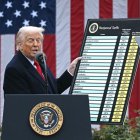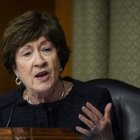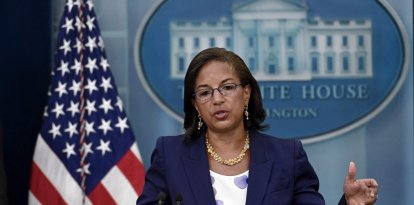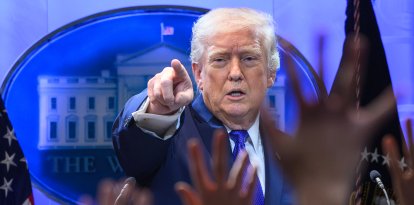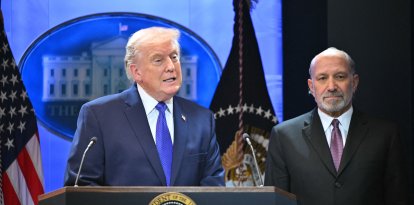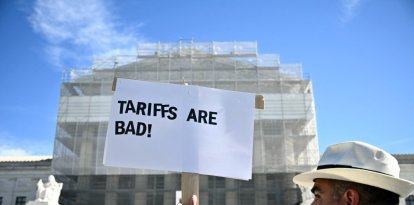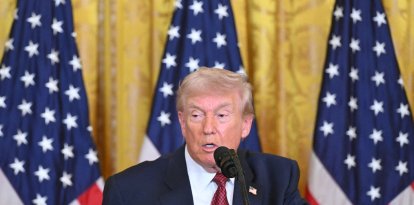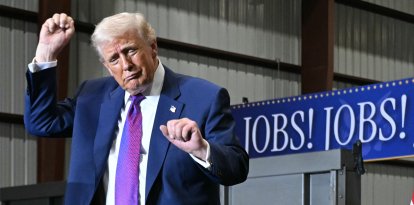World leaders reject Trump's reciprocal tariffs: "The American people will pay the biggest price"
From the White House, the president claimed to be putting an end to decades of trade injustices against the United States.
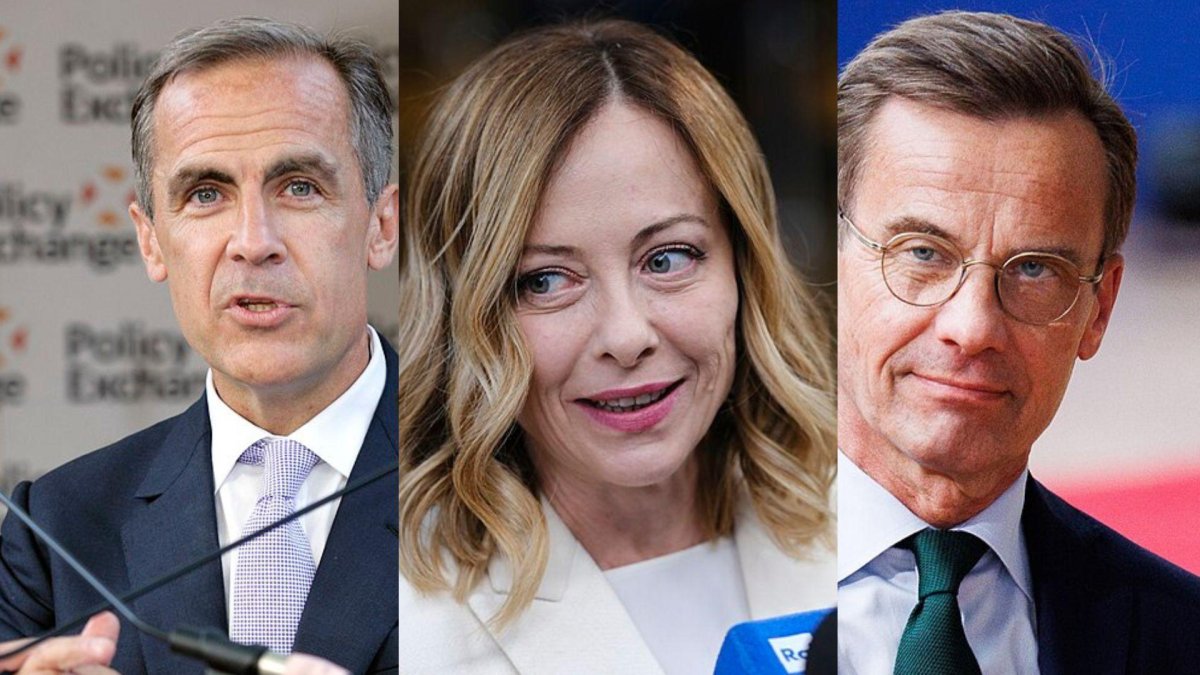
Carney, Meloni and Kristersson
Donald Trump formally imposed reciprocal tariffs on products from many countries. On a Wednesday, April 2, dubbed by the White House as "Liberation Day," the president held an event in which he assured that the tariffs will benefit American workers, also claiming that he is putting an end to decades of trade injustices against the United States. On the other side, world leaders were less than pleased with the announcements.
From the White House Rose Garden and in front of officials and various guests, Trump confirmed the implementation of tariffs. "For years, hardworking American citizens were forced to sit on the sidelines as other nations got rich and powerful, much of it at our expense," he said.
At one point, the president invited Commerce Secretary Howard Lutnick to bring her closer the tariff schedule, in which he laid out the new tariffs on a country-by-country basis. Some of the most important were those imposed on China (34%), India (26%), the European Union (20%), and Japan (24%).
Once the event was over, international reactions began to pour in, mostly with complaints about the Trump Administration's trade policy.
"Tariffs benefit no one"
One of the first to speak out was the Prime Minister of Canada, Mark Carney, who wrote the following on his X account: "Farmers, ranchers, and agrifood workers put food on the table for Canadian families."
"In the face of President Trump's unjustified tariffs, we will defend their jobs and build their sectors — by protecting supply management, doubling revenue protections, and expanding processing capacity," she added.
">Farmers, ranchers, and agrifood workers put food on the table for Canadian families.
— Mark Carney (@MarkJCarney) April 2, 2025
In the face of President Trump's unjustified tariffs, we will defend their jobs and build their sectors — by protecting supply management, doubling revenue protections, and expanding processing…
Giorgia Meloni, Italy's prime minister and an international Trump ally, responded to the tariffs during a speech at an Italian cuisine awards ceremony. "We will do everything we can to work towards an agreement with the United States, with the goal of avoiding a trade war that would inevitably weaken the West in favor of other global players," she said.
Spanish Prime Minister Pedro Sanchez condemned the increase in U.S. tariffs, calling it a 'unilateral' attack. He made the remarks while presenting a €14.1 billion support plan to aid the Spanish sectors most affected by the tariff hike.
For Manfred Weber, president of the space with the largest representation in the European Parliament, Trump's tariffs "don’t defend fair trade; they attack it out of fear and hurt both sides of the Atlantic."
"For our American friends, today is not the day of liberation; it is the day of resentment. (...) Ronald Reagan once said: 'The freer the flow of world trade, the stronger the tides for economic progress and peace among nations.' We will not give up on these words. We want a good deal with the US. Without losers - only winners," he added.
">To our American friends, today isn’t liberation day—it’s resentment day. Donald Trump’s tariffs don’t defend fair trade; they attack it out of fear and hurt both sides of the Atlantic.
— Manfred Weber (@ManfredWeber) April 2, 2025
Europe stands united, ready to defend its interests, and open to fair, firm talks.
Some leaders made it clear that they would not choose to seek retaliation. One of them was Anthony Albanese, prime minister of Australia, who will face 10% tariffs. "It is the American people who will pay the biggest price for these unjustified tariffs. This is why our government will not be seeking to impose reciprocal tariffs. We will not join a race to the bottom that leads to higher prices and slower growth," he said.
In the same vein, expressed Ulf Kristersson, Prime Minister of Sweden. "We don't want growing trade barriers. We don't want a trade war. We want to find our way back to a path of trade and cooperation together with the US so that people in our countries can enjoy a better life."
Michael Martin, prime minister of Ireland, was another of Trump's critics: "The decision by the U.S. tonight to impose 20% tariffs on imports from across the European Union is deeply regrettable. I strongly believe that tariffs benefit no one. My priority, and that of the government, is to protect Irish jobs and the Irish economy."
"(The Federal Council) will quickly determine the next steps. The country's long-term economic interests are paramount. Adherence to international law and free trade remain core values," said Swiss President, Karin Keller-Kutter for her part.
">The decision by the US tonight to impose 20% tariffs on imports from across the European Union is deeply regrettable.
— Micheál Martin (@MichealMartinTD) April 2, 2025
I strongly believe that tariffs benefit no one.
My priority, and that of the government, is to protect Irish jobs and the Irish economy. pic.twitter.com/L2dc6jnzOO
From Brazil, which will face tariffs of 10%, came mixed reactions. Congress approved a bill providing for measures in response to trade barriers imposed by other countries on Brazilian products.
On the other hand, former President Jair Bolsonaro defended Trump. "The only reasonable response to the U.S. reciprocal tariffs is for the Lula administration to abandon the socialist mentality that imposes high tariffs on American products, preventing Brazilians from accessing quality goods at lower prices," he wrote in X.
"President Trump is simply protecting his country from this socialist virus. Doubling down and escalating the crisis with our second-largest trading partner is not a wise response," he added.
">- A trade war with the U.S. is not a smart strategy that protects the interests of the Brazilian people. The only reasonable response to the U.S. reciprocal tariffs is for the Lula administration to abandon the socialist mentality that imposes high tariffs on American products,…
— Jair M. Bolsonaro (@jairbolsonaro) April 2, 2025
Without directly criticizing, New Zealand's trade secretary, Todd McClay, anticipated that they will seek to contact the White House to study the steps to follow.
"New Zealand's interests are best served in a world where trade flows freely ... New Zealand's bilateral relationship with the U.S. remains strong. We will be talking with the administration to get more information and our exporters to better understand the impact this announcement will have," he said.
There is also the case of Israel, which, as a preemptive measure, recently lifted all tariffs against U.S. products. However, Trump also announced tariffs against it of 17%. According to journalist Amichai Stein, the feeling in Tel Aviv is one of total surprise.
">Economic officials in Israel are in complete shock over the Trump administration's decision to impose a 17% tariff on Israel. "We are in shock. We were sure that the decision to completely cancel tariffs on imports from the U.S. would prevent this move. But it didn't happen." https://t.co/9FiKgNdTFn
— Amichai Stein (@AmichaiStein1) April 2, 2025
China: tariffs "have no exit door" and threatens "countermeasures"
China on Thursday denounced "protectionism and harassment" in U.S. trade policy and warned that tariffs "have no exit door," in statements reported by AFP. In addition, the authorities of the Asian giant warned that they will take "countermeasures" to protect their economy.
"What the United States needs now is to correct its malpractices and resolve its economic and trade differences with other countries (including China) through fair, respectful and reciprocal consultations," Chinese diplomacy spokesman Guo Jiakun said.
Germany and France believe tariffs are a mistake
The still leader of the German government, Olaf Scholz, considered U.S. President Donald Trump's decisions on tariffs to be "fundamentally wrong" and supported Von Der Leyen's response for Europe to react "united, strong and appropriate."
These new tariffs "constitute an attack on a trade order that has created prosperity around the world," the German leader told the press. "We place ourselves at the disposal of the U.S. government to talk and avoid a trade war," he added.
For his part, the French Prime Minister said that the imposition of tariffs "is a catastrophe for the world economy. It is an immense difficulty for Europe. And I think it is also a catastrophe for the United States and for American citizens."
UK calls imposition of tariffs "disappointing" and warns of their impact
British Trade Minister Jonathan Reynolds called Donald Trump's imposition of tariffs "disappointing," while Prime Minister Keir Starmer warned of the major "economic impact, both nationally and globally" that the move will have. However, he assured that he will continue to negotiate with the US president to get "the best deal for the UK."





